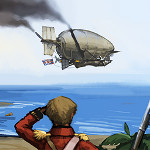|
quote:Detecting a Secret Door. Use the characters' passive Wisdom (Perception) scores to determine whether anyone in the party notices a secret door without actively searching for it. Characters can also find a secret door by actively searching the location where the door is hidden and succeeding on a Wisdom (Perception) check. To set an appropriate DC for the check, see chapter 8. quote:A trap's description specifies the checks and DCs needed to detect it, disable it, or both. A character actively looking for a trap can attempt a Wisdom (Perception) check against the trap's DC. You can also compare the DC to detect the trap with each character's passive Wisdom (Perception) score to determine whether anyone in the party notices the trap in passing. If the adventurers detect a trap before triggering it, they might be able to disarm it, either permanently or long enough to move past it. You might call for an Intelligence (Investigation) check for a character to deduce what needs to be done, followed by a Dexterity check using thieves' tools to perform the necessary sabotage. quote:For example, imagine a wizard is running down a dungeon corridor to escape from a beholder. Around the corner ahead, two ogres lie in wait. Does the wizard hear the ogres readying their ambush? You look at the wizard's passive Wisdom (Perception) score and consider all the factors weighing on it. Chapter 8 does not say anything specific about setting trap DCs, only the generic DC guide of 5 = Very Easy, 10 = Easy, 15 = Moderate, 20 = Hard, 25 = Very Hard and Nearly Impossible = 30. There is a section on Sample Traps: DC 10 to spot the tripwire of a collapsing roof trap DC 10 to spot the tripwire of a falling net trap DC 10 to spot that the cloth covering a simple pit trap is fake DC 15 to spot the absence of foot traffic over a more cleverly hidden/camouflaged pit trap DC 15 to make a similar detection of a pit trap with a locking trap door DC 15 to spot the pressure plate of a fire-breathing statue DC 15 to spot the tiny holes that would shoot the projectiles of a pressure-plate-activated poison dart trap DC 15 to spot the trapdoor and/or pressure plate of an Indiana Jones-esque rolling stone trap DC 20 Intelligence (Investigation), so NOT Perception, to detect that you will be stabbed by a spring-loaded poison needle upon opening a trapped chest DC 20 Intelligence (Arcana) to detect that the gaping mouth of a stone face carved into a wall contains a Sphere of Annihilation that will destroy any matter that enters it
|
|
|
|

|
| # ? May 31, 2024 23:50 |
|
So the solution to someone with high passive perception spoiling all of your hidden traps is sticking poison needles in every lock and spheres of annihilation in every convenient crevasse, then. Well, there you go, problem solved.
|
|
|
|
but what is "passive investigation"?
|
|
|
ActusRhesus posted:but what is "passive investigation"? Inspector Clouseau has a high rank in it.
|
|
|
|
|
ActusRhesus posted:but what is "passive investigation"? It's 10 + your Investigation bonus, same as with passive Perception.
|
|
|
|
ActusRhesus posted:but what is "passive investigation"? All checks can potentially be made "passively". See PHB page 175. This can be used to determine an average result over a long period of time or secret checks. The weird thing about improving passive investigation is that it improves the character's average deduction abilities beyond that of his... average deduction abilities. Meaning that if you ever try to specifically, actively investigate something you're probably off worse.
|
|
|
|
Passive Hide in Shadow can get kinda awkward at epic levels because you can't turn that poo poo off, but passive Sleight of Hand is horrible/hilarious from Level 1 on. Think about all the things you steal (and then get caught!) without wanting to! And don't get me started on passive Juggling, ugh the porcelain expenses...
|
|
|
|
kingcom posted:Ask your DM What if ... what if the DM says to check the book?
|
|
|
|
Pfox posted:What if ... what if the DM says to check the book? Inform your DM that he or she should ask his or her DM.
|
|
|
|
gradenko_2000 posted:It's 10 + your Investigation bonus, same as with passive Perception. Yes. I get that but what would it be used for?
|
|
|
|
Kai Tave posted:So the solution to someone with high passive perception spoiling all of your hidden traps is sticking poison needles in every lock and spheres of annihilation in every convenient crevasse, then. Well, there you go, problem solved. The solution to high levels of passive perception are even higher levels of passive aggression.
|
|
|
|
ActusRhesus posted:Yes. I get that but what would it be used for? Like I said, average effort over a long period of time. Say you cleared out a dungeon but there's hints that there is still some secret door or hatch. Instead of rolling a thousand checks and describing every single brick you prod in the place, you might just say "we examine everything" and use passive investigation values. Then the DM reveals to you what you find. (Note that there's no Take 20 rules, at least none in the PHB I could find.)
|
|
|
|
ActusRhesus posted:Yes. I get that but what would it be used for? "Taking 10" was defined in 3e as "assume the character always rolls the average of a d20, because they're not under any stress. 5e defines it as quote:A passive check is a special kind of ability check that doesn’t involve any die rolls. Such a check can represent the average result for a task done repeatedly, such as searching for secret doors over and over again, or can be used when the DM wants to secretly determine whether the characters succeed at something without rolling dice, such as noticing a hidden monster. Specific to how this applies to traps: this is from 3rd Edition, but the advice is just as applicable: quote:Dungeon adventures can be grindingly slow if the PCs make Search checks to scour every last inch of the place. You can keep things moving along by assuming that, as experienced adventurers, the party searches as it travels unless circumstances dictate otherwise. The searching specialist (usually the rogue) simply takes 10 as the PCs explore the dungeon, which is enough to reveal basic traps, hiding places, and obstacles. But never abuse this arrangement by jacking up the Search DCs of traps and hidden items. If the players start to suspect they are missing things, their characters will just revert to frequent Search checks. Keep high-DC checks for locations where the PCs would expect important things to be well hidden—and well defended.
|
|
|
|
Tunicate posted:I dunno, it sounds like the perfect excuse to have a bunch of bullshit random terrain effects that both sides are fully aware of to mix up combat. I like this idea, but does 5E have enough movement options to fully take advantage of it?
|
|
|
|
I suppose the more direct question is, where would you use investigation that perception wouldn't work equally well? Like, generally, ignoring the passive bit. We'll evaluate that once we know what the skills are really for.
|
|
|
|
Mendrian posted:I suppose the more direct question is, where would you use investigation that perception wouldn't work equally well? Like, generally, ignoring the passive bit. We'll evaluate that once we know what the skills are really for. Yeah. This is an issue I am having too. What is the functional difference between perception and investigation?
|
|
|
|
The descriptions in the books suggest that Investigation involves detecting the trap via deductive reasoning, while Perception means physically seeing/perceiving the trap through its camouflage, but you're a better man than I if you can actually make that distinction while playing the game.
|
|
|
|
AlphaDog posted:How does a protagonist who usually notices traps and ambushes get in the way of storytelling? The DM and I agreed that sometimes being surprised by things and having to use strategy to overcome unexpected difficulties can sometimes be fun and interesting.
|
|
|
|
You can't overcome things that are 100% run by the dice.
|
|
|
|
EvanSchenck posted:The DM and I agreed that sometimes being surprised by things and having to use strategy to overcome unexpected difficulties can sometimes be fun and interesting. Surprises just need to be modified with someone who has high passive perception or investigation. Consider things like reinforcements to a fight - the players know they're coming a few turns in advance, but the fact that they are coming might be surprising. Alternately, if the players know the enemies have laid an ambush in very favorable terrain, they may not know about traps/terrain features until they get close enough to inspect the area (distance penalties to perception are still a thing, right?). A player that has super high perception can still be surprised, they just get some warning before the poo poo hits the fan. Edit: Something like the players approach a necromancer lair. The perception dude notices that the graves in the area look freshly disturbed and hears scrabbling noises underneath. They know something is up with the graves and that critters are in there, but what exactly is underground is still surprising. Dirk the Average fucked around with this message at 18:49 on Oct 7, 2015 |
|
|
|
Has anyone here used the plot point variant in the DMG? IIRC, it replaces inspiration with a point a player can use, once per session, to add a twist to the game - like turning a hostile npc into a covert ally. But the player next to the spender must introduce a complication. Has anyone tried this out?
|
|
|
|
Megaman's Jockstrap posted:You can't overcome things that are 100% run by the dice. Getting ambushed or walking into a trap isn't "roll well or you're dead I guess", or it shouldn't be at least. Though you can't completely control whether or not it happens because it's somewhat random, the possibility that it can happen affects player behavior. It prevents players from being too certain in the longer term that they have the resources to deal with exactly X more obstacles, which starts to sound kind of grindy. Dirk the Average posted:A player that has super high perception can still be surprised, they just get some warning before the poo poo hits the fan. The problem I have with things like the observant feat is that it seems to just limit options. The DM will generally have a few ideas floating around of ways to make encounters interesting (hidden enemies/traps, reinforcements, the floor is collapsing, there's a VIP to protect, gravity changes direction every round). The observant feat lets one player effectively scratch one thing off the list for the entire party; The DM can't hide things anymore without some serious "it was literally invisible" hand-waving. I feel that this is more of a problem with how passive checks work than a character being exceptionally perceptive, though. The DM knows what people's passive scores are and decides the DCs on the checks, so instead of deciding how difficult things are to spot, you just have to decide whether they get spotted or not with no variability. I should probably just roll checks for how well things were hidden.
|
|
|
|
Vanguard Warden posted:The problem I have with things like the observant feat is that it seems to just limit options. The DM will generally have a few ideas floating around of ways to make encounters interesting (hidden enemies/traps, reinforcements, the floor is collapsing, there's a VIP to protect, gravity changes direction every round). The observant feat lets one player effectively scratch one thing off the list for the entire party; The DM can't hide things anymore without some serious "it was literally invisible" hand-waving. Here's the thing: knowing that something is hidden is very different than knowing exactly what is hidden. Mix up what players find. Give them time limits as well. Sure, they know that something is rustling in the well, but the bad guy just fled with a hostage and is it worth hanging back to check out or is it more important to press onwards? Have players sometimes find that multiple critters are in an area, but maybe they investigate and find a cat or something. Use what they know in interesting ways, and use distance penalties to your advantage where the true nature of what they find is obscured until they get close. It's really boring if you just put bandits on the road for the fifth time, but not every use of perception needs to be finding enemies lying in wait.
|
|
|
|
ActusRhesus posted:Yeah. This is an issue I am having too. What is the functional difference between perception and investigation? I have to guess a bit on this, but imagine a scene where the party stumbles on an apparently uninhabited dining room in a dungeon. Perception might tell you that you hear breathing and see the seams of a trapdoor - there are likely creatures hiding under them. Investigation might tell you that the food on the tables, the scratches on the walls and tables, and the size of the plates/eating implements point to the idea that goblins were eating here until very recently and that they had at least one warg with them. Combining the two you now know what lies in wait; with only perception you don't know what's there, and with only investigation you don't know where they are. I take it as perception is noticing things and investigation is piecing together what those things actually mean. As always though, ask your DM.
|
|
|
|
Dirk the Average posted:Sure, they know that something is rustling in the well, but the bad guy just fled with a hostage and is it worth hanging back to check out or is it more important to press onwards? I hate the idea of this, as a DM; let's come up with material we'll inevitably have to completely throw away, unless you wanna recycle and shoehorn it in later
|
|
|
|
Dirk the Average posted:I have to guess a bit on this, but imagine a scene where the party stumbles on an apparently uninhabited dining room in a dungeon. But why is that sort of fidelity needed? Why not just have one check to roll against? Is anyone's enjoyment increased by that much due to having to roll two dice?
|
|
|
|
Pfox posted:But why is that sort of fidelity needed? Why not just have one check to roll against? Is anyone's enjoyment increased by that much due to having to roll two dice? It's so the wizard can be good at this poo poo. oh, won't someone think of the wizards?? 
|
|
|
|
Passive perception lets your players spot the traps in their way, passive investigation lets you analyse the traps as you adventure and write up your conclusions in a letter for The international Journal of Trapfinding iv: Duergar and Svirfneblin during a long rest.
goatface fucked around with this message at 19:57 on Oct 7, 2015 |
|
|
|
Pfox posted:But why is that sort of fidelity needed? Why not just have one check to roll against? Is anyone's enjoyment increased by that much due to having to roll two dice? I'm not saying it's a good idea, just that if there has to be a difference that what I'd use as the difference. Thinking about it more, it makes a great replacement for Knowledge skills as a catch-all to let you analyze information and get clues you wouldn't otherwise get without getting screwed by not having Knowledge: Ancient Atlantean Basketweaving on your character sheet.
|
|
|
|
Maybe it's meant to be passive "It's a river, you bunch of fuckwits. Your passive investigation tells you that all the loving paintings of river scenes and the dozens of water elemental traps and their stated worship of a river god point to the answer being A RIVER. Jesus Christ, that was like babby's first riddle."
|
|
|
|
Passive investigation is when the cops from Law and Order go down to the warehouse to interview the dude as he's lifting crates but they can totally tell just from standing there that the warehouse... is moving DRUGS!!!
|
|
|
|
Dirk the Average posted:I'm not saying it's a good idea, just that if there has to be a difference that what I'd use as the difference. I actually think that's a pretty solid idea.
|
|
|
|
Is there any rulestext that would prevent you from attacking, using a hand you're already grappling with? (against the grappled creature specifically, but I guess against other creatures might matter, too)
|
|
|
|
P.d0t posted:Is there any rulestext that would prevent you from attacking, using a hand you're already grappling with? (against the grappled creature specifically, but I guess against other creatures might matter, too) Not really. PHB posted:Using at least one free hand, you try to seize the target by making a grapple check... That's the only mention of your hand in both "Grappling" on page 195 and the Grappled condition in appendix A (the condition only mentions the effect ending if the target is outside your reach). Ask your dm etc etc.
|
|
|
|
Naw, it's actually meant to be passive aggressive investigation. "You realize the man you're talking to is lying as soon as he speaks, something maybe the other players could've understood if they actually tried to be good at their skills maybe once a game?"
|
|
|
|
ProfessorCirno posted:Naw, it's actually meant to be passive aggressive investigation. "You realize the man you're talking to is lying as soon as he speaks, something maybe the other players could've understood if they actually tried to be good at their skills maybe once a game?" I've gotten like that before. "Please stop rolling like poo poo guys, I'm a comedy character and I hate having to be competent for you all the time."
|
|
|
|
EvanSchenck posted:The DM and I agreed that sometimes being surprised by things and having to use strategy to overcome unexpected difficulties can sometimes be fun and interesting. Huh? How can you use strategy until you get some information? Strategy is what happens after you notice or find out something. Which is what perception let's you do. For example, if you notice a pit trap, you can use strategy to decide whether to avoid it, disarm it, or throw an enemy into it. If you don't notice the trap, you fall in the pit and take damage, and then either break out the rope or use your climb skill.
|
|
|
|
The alternative is Aggressive investigation, AKA L.A. Noire.
|
|
|
|
P.d0t posted:I hate the idea of this, as a DM; let's come up with material we'll inevitably have to completely throw away, unless you wanna recycle and shoehorn it in later You should always do this/it always happens anyway, though. No plan survives contact with the A lot of this comes down to pacing, too. If players are stuck spinning their wheels, not going anywhere, drop one of these big or small bombshells for them to react to, and make sure it at least provides some kind of clue or an impetus to move them in some direction. Whereas if they actually have a plan they're interested in and actively pursuing, cool, roll with that.
|
|
|
|

|
| # ? May 31, 2024 23:50 |
|
Passive investigation as social trapfinding.
|
|
|























